The crown jewel of Yunnan
China Daily2025-06-09 20:06
Villagers leverage the natural, beginner-friendly mountain environment to boost tourism and incomes, Yang Feiyue and Li Yingqing report.
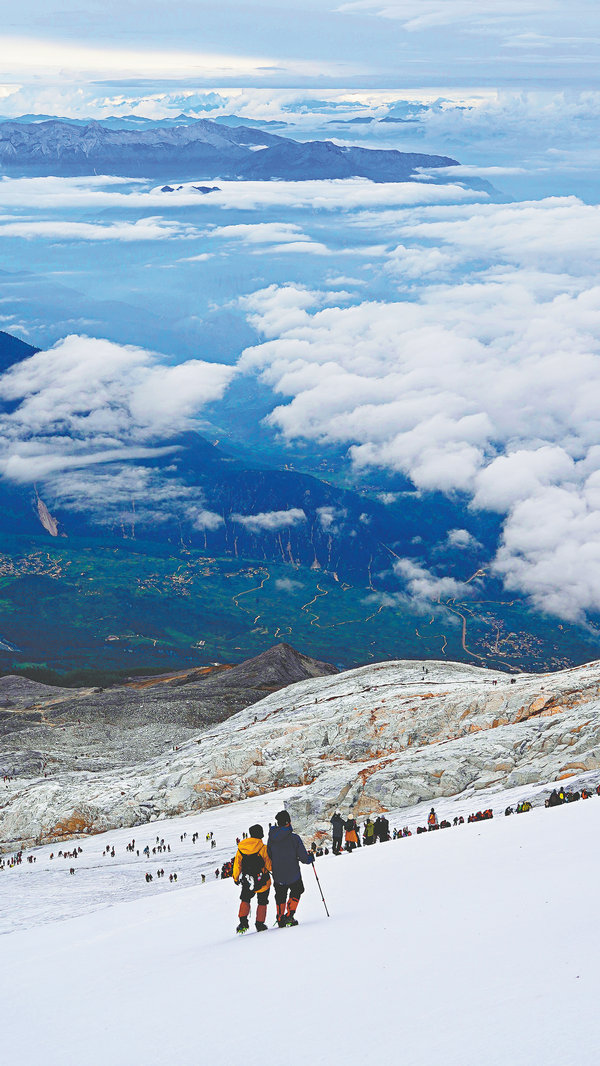
The Haba Snow Mountain in Yunnan province is a big draw for mountaineering enthusiasts. [Photo by SUN XIAO/FOR CHINA DAILY]
At a towering 5,396 meters, Haba Snow Mountain pierces the sky like a jagged silver crown. Its summit is eternally cloaked in snow, reigning over the surrounding lesser peaks that bow in reverence as their rugged silhouettes frame the mountain's solitary grandeur.
From the lush, moss-draped forests at 2,650 meters to the treacherous scree slopes and glaciers above 4,000 meters, the terrain violently morphs, running a 3,800-meter gauntlet of nature's extremes.
Rising like a frozen sentinel in the Diqing Tibetan autonomous prefecture, southwestern China's Yunnan province, Haba Snow Mountain stands as the province's sole climbable "starter" peak for mountaineering enthusiasts. Its relatively accessible glaciers and well-established routes have made it legendary among climbers nationwide.
Unlike the technical verticality of the Himalayas, Haba offers beginner-friendly snow trekking, making it an ideal training ground for ice axe and crampon (boot spikes) skills.
The classic ascent begins in Haba village at the western mountain foot, where the cobblestone streets buzz with excited climbers gearing up.
"One moment, you're breathing in the damp earthiness of ancient pines; the next, you're scrambling across ridges where the wind howls and rocks skitter," says Chen Jizhong, 33, who has ridden on the back of the mountain's rising popularity.
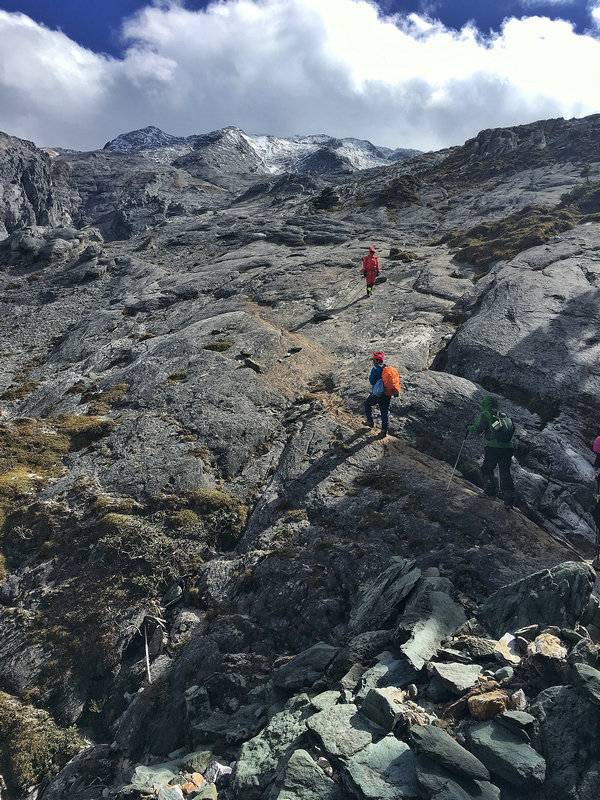
The Haba Snow Mountain in Yunnan province is a big draw for mountaineering enthusiasts. [Photo by SUN XIAO/FOR CHINA DAILY]
Over the past five years, his life has taken off as he started offering accommodation and climbing services for mountaineers across the country.
Following the May Day holiday frenzy, Chen took a break and went to a local bank to open a company account.
His service met the local government's requirements and is now certified to receive guests. He sees it as a good sign for the future, as things become standardized.
In 2009, Chen, then a teenager from the Yi ethnic group, laced up his military sneakers, wrapped a thick scarf around his neck, and became a mountain guide.
His inaugural climb ended abruptly when his ill-equipped team had to abort the expedition after being stranded in a blizzard.
"Youth made me fearless — I didn't understand danger back then," Chen recalls with a laugh, though his eyes betray a lingering reverence for the mountain's lessons.
By 2012, after witnessing multiple accidents, Chen committed himself to professional training, from high-altitude first aid to storm survival, eventually summiting the 6,178-meter Yuzhu Peak in Qinghai province.
"Now, safety is carved into my bones," he says.
The mountain's transformation mirrored his own. Once isolated, Haba village now thrives as an outdoor hub after road expansions and trail construction.
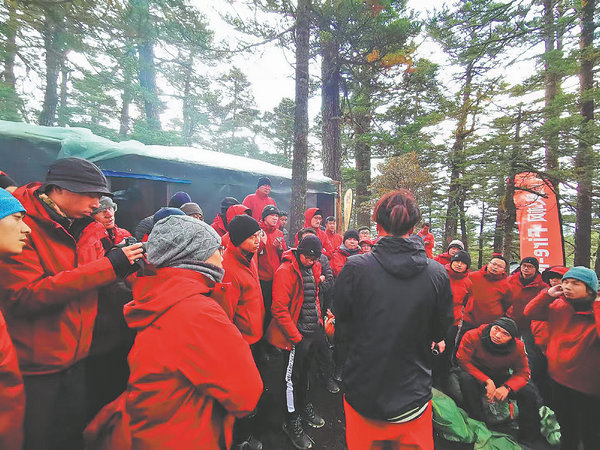
Climbers receive training before hiking. [Photo by SUN XIAO/FOR CHINA DAILY/CHINA DAILY]
A golden ticket
Recognizing the region's untapped potential, local authorities have strategically positioned Haba Snow Mountain as a crown jewel along western Yunnan's grand tourist loop. The transformation began in 2003 when Diqing prefecture hosted a huge mountaineering festival in Haba village.
Over the ensuing two decades, the village blossomed into a model of sustainable mountain tourism. The community masterfully leveraged its unique geographical gifts, creating an irresistible draw for global trekking enthusiasts.
Haba village now offers integrated adventure tourism services, including tailored mountain experiences with certified local guides, authentic cultural immersion through Yi ethnic homestays, seamless logistics including gear transport, and gastronomic journeys featuring local ingredients, says Wang Yonghua, a village official.
Local authorities significantly improved infrastructure by funding road construction and expansion, enhancing traffic flow, and reducing accidents while upgrading muddy horse trails to safer paths for the villagers and tourists, Wang adds.
Additionally, power grid modernization stabilizes electricity supply during harsh weather, replacing frequent outages, and clean tap water is in good supply.
Comprehensive telecom coverage and a household subsidy for toilet upgrades also contributed to the overall improvement of public utilities and living standards.
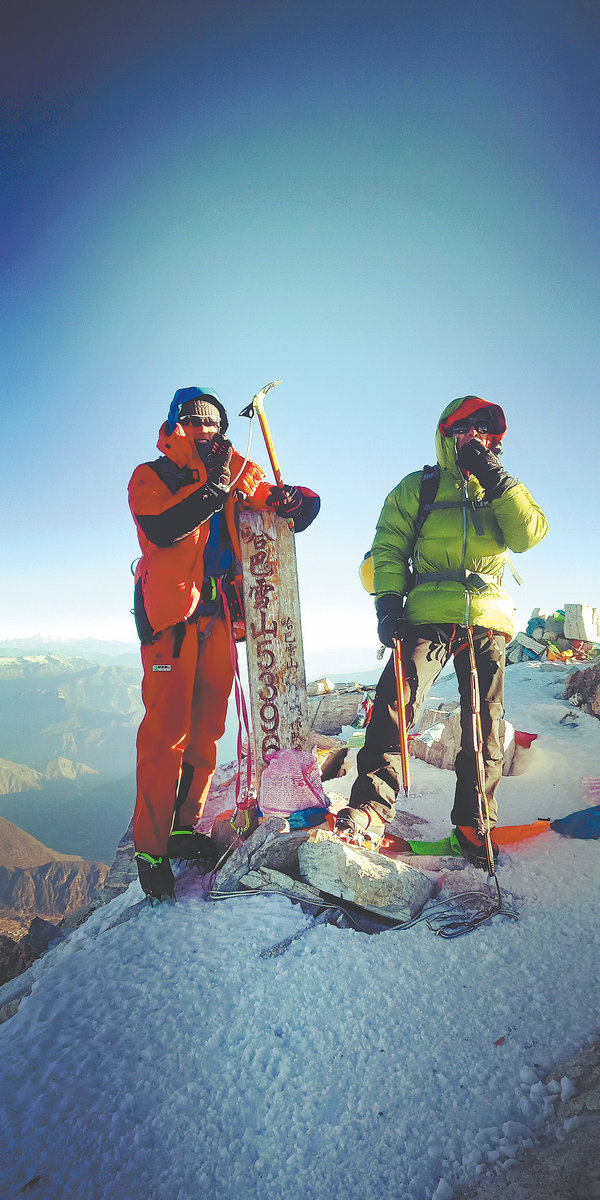
Chen Jizhong (left) and a climber pose at the top of the mountain in 2015. [Photo by SUN XIAO/FOR CHINA DAILY]
Those efforts have fueled the rural economy. Former subsistence farmers have evolved into hospitality entrepreneurs.
Chen seized the opportunity and cofounded a tent camp in 2020. By 2023, he invested his savings into building a homestay.
"We used to see these peaks as barriers," he reflects.
"Now, they're our golden ticket." Chen isn't alone in his success.
Sha Zhidong's life has also moved toward prosperity since he engaged in mountain-related tourism.
The 39-year-old villager vividly remembers how most families relied on farming and foraging — selling crops like peppercorns, walnuts and wild mushrooms — before 2012.
"Annual household incomes averaged just 3,500-5,000 yuan ($487-$695)," he says.
Sha's entry into mountaineering was serendipitous. At 17, while foraging for medicinal herbs, he worked as a kitchen helper for a guide who later recruited him to lead climbs.
His first attempt ended at 5,200 meters due to client fatigue, a common issue in the early days when gear was scarce and training minimal.
A pivotal moment came when Sha survived a 200-meter fall after lending his crampons to a teammate.
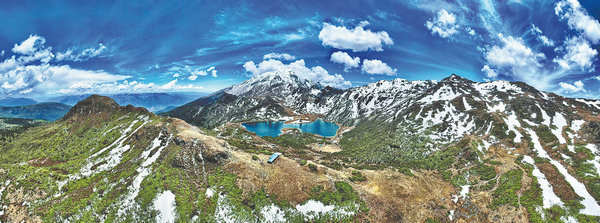
A bird's-eye view of the Black Lake in the hinterland of the Haba Snow Mountain. [Photo by D.J. CLARK/CHINA DAILY]
This near-disaster spurred him to pursue formal training in avalanche rescue, first aid, and oxygen use.
By 2013, Haba village mandated a 1:1 guide-to-client ratio, institutionalizing safety standards, which Sha says he couldn't champion more. In 2017, he used a government grant to build Haba's first ethnic Yi homestay.
As his guiding business expanded, he began regularly leading groups of about 30 climbers each day.
"Our modest three-room guesthouse was never intended for such volume, so I partner with larger hotels in the area to accommodate guests," he says.
Those services have brought Sha earnings of about 120,000 yuan annually.
To date, more than 50 homestays across the village, along with 12 restaurants and 400 guides serving 17,000 annual visitors, generate about 19 million yuan in tourism revenue, according to local officials.
Despite 50 competing lodges, Sha plans to invest 800,000 yuan in a premium homestay, betting on service quality over subsidies.
He believes competition elevates the village collectively.
"Better offerings attract more visitors, benefiting everyone," he says.
Developing responsibly
Since tourism became Haba village's economic cornerstone, officials have worked to standardize guide certifications, regulate adventure companies, and enhance environmental protection.
The goal is to develop Haba Snow Mountain responsibly, preserving its majesty for future generations while ensuring current visitors receive safe, high-quality experiences, says village official Wang.
The mountain resort received approximately 1,000 climbing applications daily during the National Day holiday last year, far exceeding its recommended capacity of 200 visitors — a threshold set to protect both the fragile alpine ecosystem and climber safety.
In response to growing pressures, local authorities proposed to upgrade standard climbing package offers and mountain management.
Sha supports measures like visitor caps and waste management.
"If the environment is destroyed, our livelihoods vanish," he says.
Amid the rising competition, Chen says he will resist cutthroat pricing.
"Discounting for ill-prepared hikers risks lives," he explains.
Customer trust has become Chen's currency, as gratitude-filled pennants from his guests adorn the walls of his homestay. Trust is what earns him good reviews that further attract new customers, he notes.
Chen plans to enhance value through free acclimatization hikes and personalized altitude coaching with firm but reasonable fees.
"Some clients ask me to guide them to 6,000-meter peaks," he says, eyes alight.
"As long as I'm able, I'll keep climbing and help others discover Haba's magic."
